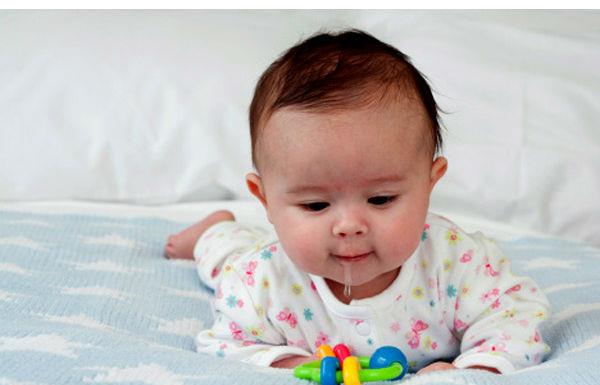Unlike pathological fever, teething fever often comes with many signs such as drooling a lot, anorexia, irritability, swollen red gums ... These symptoms will go away on their own when the baby's teeth pop up. Distinguishing between a fever and a fever caused by teething will help mothers to have an appropriate treatment, to avoid affecting the health of the baby.
content
1 / Symptoms when the child has a fever
2 / Tips to prevent fever caused by teething
3 / Suggest ways to help children reduce pain when teething
4 / Things to avoid
Usually, children start to develop their first tooth when they are 6-7 months old and complete 20 baby teeth when they are about 3 years old. Parents should prepare the necessary psychology and knowledge to not be too surprised and worried about the baby. Many mothers confuse teething fever with a pathological fever, so there is no timely intervention, leading to an affected baby's health.
1 / Symptoms when the child has a fever
In addition to fever, teething babies often come with many signs such as: Baby drooling, itchy teeth, so like to "gnaw" everything, observing that the baby's gums are red, swollen or not over 39 degrees Celsius, sometimes the baby has diarrhea. After about 2-3 days, the teeth will start to appear and also the time the fever will decrease and then disappear.
Note for mothers: As recommended by the American Academy of Pediatrics, all cases of children with fever over 39 degrees should not be attributed to any dental problems, including teething fever. So, as soon as the baby shows signs of a high fever, the mother should find a way to reduce the fever immediately. If there is no sign of fever reduction, the baby should be taken to the hospital for prompt treatment.

Teething fever is often accompanied by signs of teething such as: drooling, itchy teeth, red swollen gums
2 / Tips to prevent fever caused by teething
Depending on the location and health status of each baby, most babies will have a fever when teething, but some babies will not have a fever but only a few signs of teething. To help minimize the possibility that your baby will have a mother fever, these simple folk tips can be used.
Use chives
According to folk experience, when the child is 3 months old, the mother should use the chives leaves to make the gums for the baby, 9 leaves for girls and 7 leaves for the boys. The implementation is very simple, the mother only needs to use a little fresh chives leaves, crushed to get the water. The chives leaves have a pungent odor, if the baby can't stand it, the mother can steam it. After taking the juice of chives leaves, the mother uses the tongue thread to absorb the water and gently dab it on the baby's gums. Use this method when the baby teething will not have a fever or only have a mild fever.
Green bean juice
Many mothers often pass on the formula to use green bean juice to help children not have a fever when teething. After giving birth 100 days, mothers use 100 peas, broken in half, put in a pot and boil with water. No need to wait until the bean is tender, just boil it for a while and use this water to benefit your baby. Mothers remember to do exactly the day babies are 100 days old (3 months 10 days) to be effective.
Baby eat na fruit
In order to help your baby not have a fever during teething, mothers should regularly feed the baby. When feeding the baby, the mother should choose the fruit that is big, blooming, peeling into small chunks and removing the seeds. At this time, the baby cannot chew, so the mother should mash or feed the baby evenly.
3 / Suggest ways to help children reduce pain when teething
Seeing the baby hurt and upset makes the mother not reassured. So, to help your baby through this stage, please help her by the following:
- A warm bath will help your child calm down and forget some of the pain.
- When new teeth appear, children love to "nib" everything to reduce the discomfort of itchy gums. At this time, the mother should let the baby suck in cold compresses or specialized toys for teething babies. The coolness radiating from the toy is used to relieve the baby's pain.
- For more convenience, mothers can use a clean towel, soft cotton cloth for the refrigerator. Then let the baby "gnaw" comfortably, both helping the baby not fussy and effectively reducing the pain.
- Mother's soft fingers can ease the pain by gently massaging the baby's benefits.
- Give your baby soft foods such as porridge and soup so that they don't have to chew and swallow much.

Let your baby suck on a cold pacifier or a toy to reduce discomfort

Nutrition for your baby in the teething period Soft and spongy pureed foods are still top priority, because these pureed foods help babies eat a lot without having to chew. Even older babies can eat this food at teething if it is difficult to chew the food.
4 / Things to avoid
- Let your baby use the adult medicine, even if the dose is divided. Only give your baby fever-reducing medicine if the fever is continuously above 38.5 degrees Celsius.
- Lowering the room temperature is too low: Unlike many mothers, lowering the room temperature will not help your baby reduce fever or feel more comfortable. Ideally, you should maintain the room temperature between 25-27 degrees Celsius, avoid a cold.
- To help your baby reduce the discomfort of teething, the mother can give the baby a cold compress or a toy dedicated to teething babies. However, absolutely do not wrap an ice cube in a thin cloth to give your child to suck on, or to let him suck on frozen fruit. Your baby is at risk of choking or choking if accidentally swallowing an ice cube or piece of fruit.














